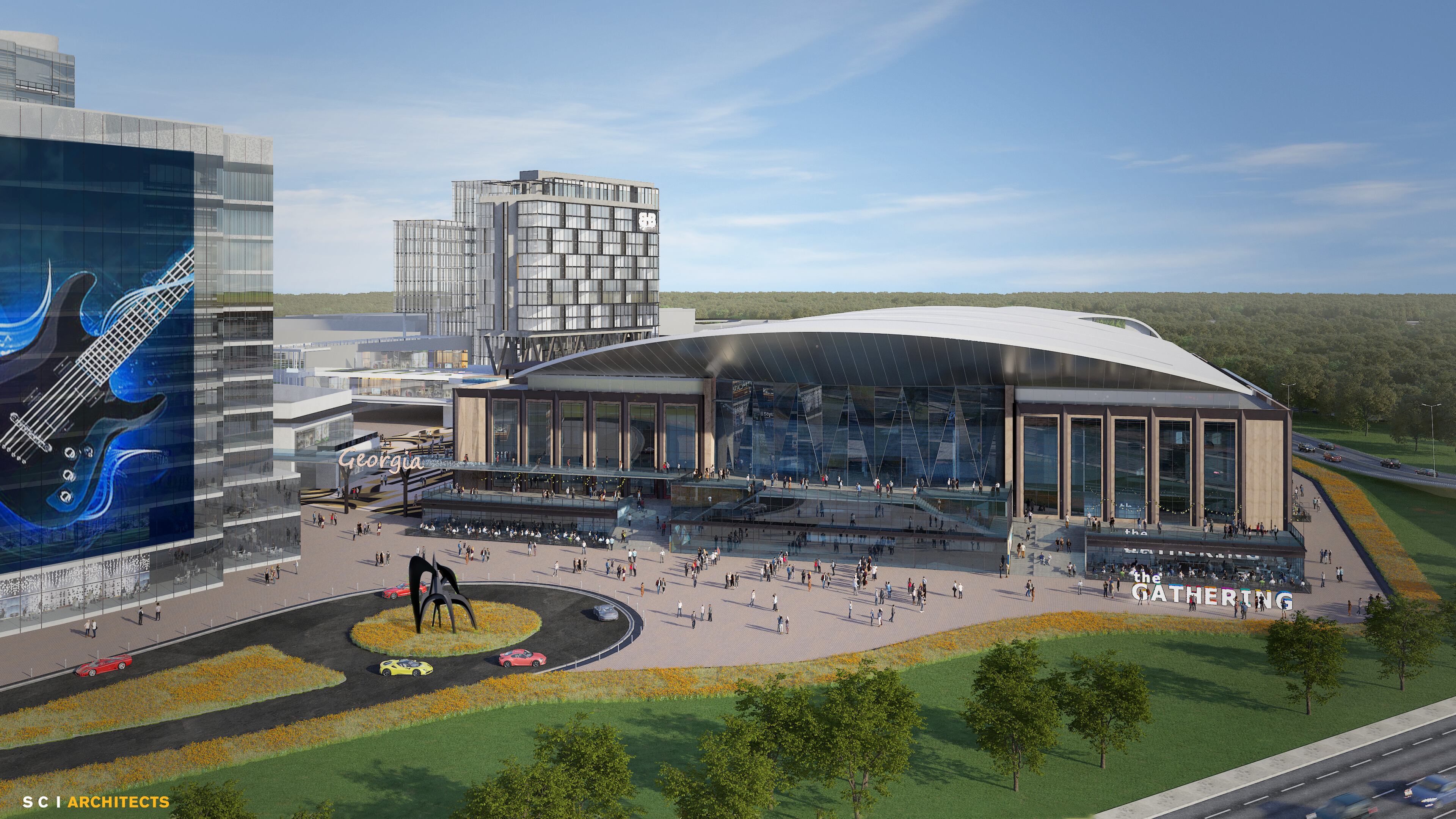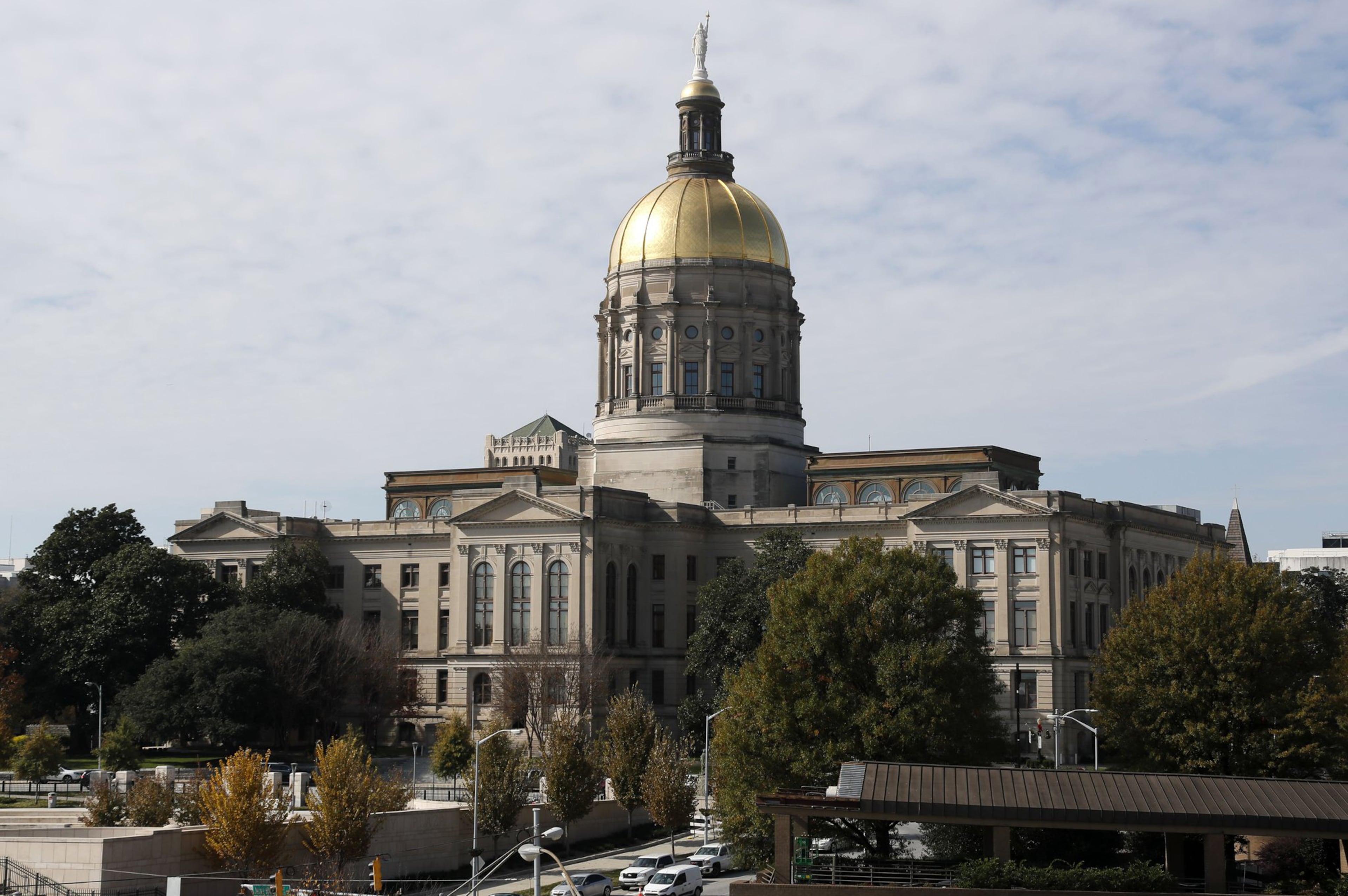Glitzy $2B Forsyth arena district comes with many unknowns

A Georgia car dealership king created a stir this week with an ambitious plan to build a $2 billion entertainment district 30 miles north of downtown Atlanta in Forsyth County centered around an arena large enough arena to anchor a professional hockey team.
Longstanding hockey fans latched onto the dream of metro Atlanta getting its third shot at an NHL franchise, while others balked at south Forsyth’s distance from the region’s core.
The proposal is long on pizzazz and attractive renderings, but short on crucial details such as how it will be financed and how much its developers might ask of taxpayers to help realize the vision. Called the Gathering at South Forsyth, the project parallels the development model of the Battery at Truist Park, which brought the Atlanta Braves to Cobb County.
Carl Hirsh, a managing partner with consulting firm Stafford Sports and a development team member, said the 18,000-seat arena will have all the bells and whistles required to woo an NHL team to Georgia. But he emphasized the project is not contingent upon professional hockey’s return.
“We’re not here to talk about hockey. We’re here to talk about a development,” he told The Atlanta Journal-Constitution. “... We’re looking at this as creating the entertainment hub for North Georgia.”
Representatives denied repeated requests by the AJC to interview Vernon Krause, CEO of Krause Auto Group, and the leader of the Gathering project.
Forsyth commissioners, meanwhile, did not make themselves immediately available to the AJC for interviews about the most ambitious real estate project the county has ever seen.

Hirsh said their analysis shows an arena the size of downtown’s State Farm Arena could turn a profit without an anchor tenant, such as an NHL team. Economists and sports management experts told the AJC there were too few details to yet know whether the project is feasible.
“I never like to hate a project when I first see it, but there’s a lot of really good questions logistically to be asking,” said Bob Boland, a sports law professor at Seton Hall Law School in New Jersey.
Footing the bill
A decade ago, the Braves struck a deal with Cobb to move roughly a dozen miles up I-75 to a flashy new stadium and development now called the Battery.
The Braves’ move, now a point of pride for Cobb, came at a political cost. Some residents balked at the $300 million in taxpayer support for the deal and county’s then-chair Tim Lee, an architect of the move, was ousted from his job. Though the Battery is often packed with revelers on gamedays and non-gamedays alike, and backers like to point to that activity as an economic win for Cobb, Kennesaw State University economist J.C. Bradbury authored a report finding it hasn’t been an economic home run.
“Stadiums are actually very poor drivers of economic development,” he said.
Forsyth’s leaders may be venturing onto thin ice. Forsyth sits further from Atlanta than Cobb with a third of Cobb’s population and a significantly smaller tax base.
The commissioners of the deep-red exurban county, once a hotbed for anti-tax tea party protests, haven’t said whether they will attempt to levy taxes or provide other taxpayer-backed financing.
Contacted by the AJC on Monday, the county’s five commissioners didn’t immediately say whether they’d support using public dollars to help build or support the project.
But in statements, Forsyth officials seem supportive. Commission Chair Alfred John called the Gathering an “economic driver like no other” that will generate “thousands of jobs” for the region.
While the public cost is uncertain, developers say an extensive overhaul of nearby roads and infrastructure would be needed, including a new interchange along Ga. 400, something the Gathering backers say the state is already planning. Judith Grant Long, a sports management professor at the University of Michigan, said location is vital, especially when events may be on weeknights and attendees have to contend with commuter traffic.
“For an NHL arena, you would have weekday evening games, and that can be a tremendous challenge for your target market to get to the venue on time,” she said.
Getting community feedback
Hirsh said there will be enough demand for concerts, collegiate sports, graduations and other events to plug the gap if a hockey team doesn’t relocate. He said that other nearby venues, such as Ameris Bank Amphitheatre in Fulton County and Gas South Arena in Gwinnett County, currently don’t meet the needs of the area.
He added that the development team isn’t targeting the Atlanta market, arguing that the northern suburbs comprise an undercapitalized segment of the region with disposable income.
Hirsh said growth and the wealth of Forsyth and nearby areas “makes perfect sense” for an entertainment hub.
Online reaction among Forsyth County residents has been split. Some welcomed a large venue, so they wouldn’t have to travel and fight Atlanta traffic. Others worried the arena’s events would worsen local congestion.
“Everyone in Forsyth already complains about the travel time in the county,” said resident Bonnie Blanton. “If Forsyth keeps building, we will need eight lanes on every road to navigate the county’s traffic.”

Krause is an auto dealer whose last big real estate pitch was a 60-acre tennis facility in Roswell that unraveled after a community uproar.
In hindsight, Krause told 11 Alive a few years ago, he should have “held public hearings, gotten everybody’s input” before pressing ahead with that doomed tennis complex. More details about the Gathering are expected to be made public at an April 25 commission meeting.
The Gathering at South Forsyth
- An 18,000-seat arena
- 2,400 residential units
- A 500-room hotel
- 1 million square feet of offices
- 600,000 square feet of retail
- A community center and ice rink
- A fire station




